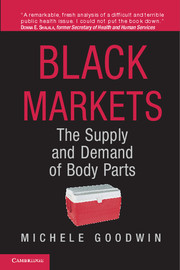Book contents
- Frontmatter
- Dedication
- Epigraph
- Contents
- Miscellaneous Frontmatter
- Preface
- Acknowledgments
- BLACK MARKETS
- PART ONE UNDERSTANDING THE STRAIN ON ALTRUISM
- PART TWO LEGAL FRAMEWORKS AND ALTERNATIVES
- PART THREE CRITIQUING THE SLAVERY AND BLACK BODY MARKET COMPARISON
- 9 Critiquing the Slavery and Black Body Market Comparison
- 10 Conclusion
- Notes
- Bibliography
- Index
10 - Conclusion
from PART THREE - CRITIQUING THE SLAVERY AND BLACK BODY MARKET COMPARISON
Published online by Cambridge University Press: 14 September 2019
- Frontmatter
- Dedication
- Epigraph
- Contents
- Miscellaneous Frontmatter
- Preface
- Acknowledgments
- BLACK MARKETS
- PART ONE UNDERSTANDING THE STRAIN ON ALTRUISM
- PART TWO LEGAL FRAMEWORKS AND ALTERNATIVES
- PART THREE CRITIQUING THE SLAVERY AND BLACK BODY MARKET COMPARISON
- 9 Critiquing the Slavery and Black Body Market Comparison
- 10 Conclusion
- Notes
- Bibliography
- Index
Summary
Competent systems are not lacking in controversy or bias. Controversies as well as unattractive trade-offs are the natural outgrowths of change. Each procurement option discussed in this book is burdened by an undesirable aspect. This is a reality from which we cannot hide. Altruism too, when scrutinized, reveals unattractive flaws. Yet, change is often justified by a compelling government interest in the safety and health of its citizenry or even to correct past harmful behavior. For example, presumed consent, which permits involuntary donations absent refusal, requires for going autonomy, consent, privacy, and possibly accepting or mildly tolerating the possibility that religious freedom may be violated.
Presumed consent statutes were passed in 29 states, permitting cornea removal without donor or family consent so long as families have not objected. Naturally, the irony is that the dead cannot raise an objection, nor would a person know to whom he or she should object. Most Americans are unaware of these legislative procurement tools and strategies. Most statutes require a reasonable effort to contact families. These efforts are not enforced and may in fact be more delusive than real as homeless people, the poor, and those more likely to be uninformed participants may not have phones – the method most often used to contact relatives.
However, an adequate supply of organs could be harvested through that institutional choice. Presumed consent, as an institutional choice, would not be difficult to implement; however, it would pose significant legal, moral, religious, and social challenges. It is one of the more difficult choices because it compromises the most intimate spheres of our relationship with the state, not to mention our bodies. For these reasons and more, presumed consent is a burdened alternative. The risks are very high in comparison to what might be gained for the individual or her family supplying the organ. Indeed, a policy that requires a waiver of constitutional rights in order to save the life of others is a burdened choice. Would opting out really work? Because timing is critically important to organ and tissue harvesting, the necessity to transplant in a timely manner might supercede waiting for a possible objection, particularly with the most viable tissues requiring harvesting within 3 to 6 hours after death.
- Type
- Chapter
- Information
- Black MarketsThe Supply and Demand of Body Parts, pp. 207 - 212Publisher: Cambridge University PressPrint publication year: 2006



